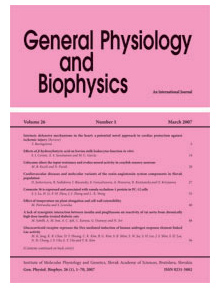Journal info
Aims and Scope |
||
Select Journal
Journals
Bratislava Medical Journal Endocrine Regulations General Physiology and Biophysics 2024 2023 2022 2021 2020 2019 2018 2017 2016 2015 2014 2013 2012 2011 2010 2009 2008 2007 Neoplasma Acta Virologica Studia Psychologica Cardiology Letters Psychológia a patopsych. dieťaťa Kovove Materialy-Metallic Materials Slovenská hudbaWebshop Cart
Your Cart is currently empty.
Info: Your browser does not accept cookies. To put products into your cart and purchase them you need to enable cookies.
General Physiology and Biophysics Vol.35, No.1, p.25–34, 2016 |
||
| Title: Sulforaphene promotes Bax/Bcl2, MAPK-dependent human gastric cancer AGS cells apoptosis and inhibits migration via EGFR, p-ERK1/2 down-regulation | ||
| Author: Arindam Mondal, Raktim Biswas, Yun-Hee Rhee, Jongkee Kim, Jin-Chul Ahn | ||
| Abstract: Gastric cancer migration and invasion considered as main causes of this cancer-related death around the world. Sulforaphene (4-isothiocyanato-4R-(methylsulfinyl)-1-butene), a structural analog of sulforaphane, has been found to exhibit anticancer potential against different cancers. Our aim was to investigate whether dietary isothiocyanate sulforaphene (SFE) can promote human gastric cancer (AGS) cells apoptosis and inhibit migration. Cells were treated with various concentrations of SFE and cell viability, morphology, intracellular ROS, migration and different signaling protein expressions were investigated. The results indicate that SFE decreases AGS cell viability and induces apoptosis in a dose-dependent manner. Intracellular ROS generation, dose- and time-dependent Bax/Bcl2 alteration and signaling proteins like cytochrome c, Casp-3, Casp-8 and PARP-1 higher expression demonstrated the SFE-induced apoptotic pathway in AGS cells. Again, SFE induced apoptosis also accompanied by the phosphorylation of mitogen-activated protein kinases (MAPKs) like JNK and P-38. Moreover, dose-dependent EGFR, p-ERK1/2 down-regulation and cell migration inhibition at non-toxic concentration confirms SFE activity in AGS cell migration inhibition. Thus, this study demonstrated effective chemotherapeutic potential of SFE by inducing apoptisis as well as inhibiting migration and their preliminary mechanism for human gastric cancer management. |
||
| Keywords: Sulforaphene — Gastric cancer — Apoptosis — Migration inhibition — MAPKs | ||
| Published online: 15-Dec-2015 | ||
| Year: 2016, Volume: 35, Issue: 1 | Page From: 25, Page To: 34 | |
| doi:10.4149/gpb_2015033 |
||
|
|
 download file download file |
|

